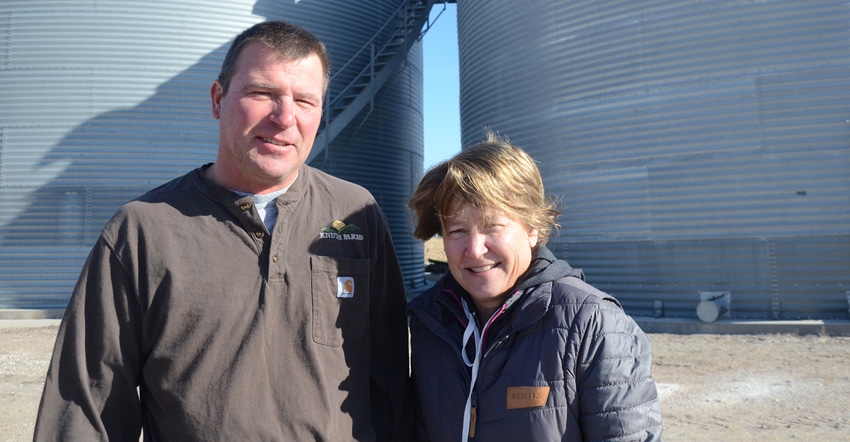
For Angela and Kerry Knuth, diversification has been a work in progress. It's dynamic, and their plans change all the time.
But it isn't just crop rotations and markets that have diversified. They've also got four people weighing in on management decisions on the farm, a process that presents its own benefits and hurdles.
Angela manages the precision data and agronomy side of the operation, while Kerry handles the marketing and logistics side. Their sons, Gregory, 22, and Garrison, 20, are actively involved on the farm.
Gregory, who studied diesel mechanics at Southeast Community College, maintains and repairs equipment. Garrison, who is studying accounting at Metropolitan Community College, assists Kerry in managing the farm's finances and record keeping.
"We do pretty much everything in-house," Angela says. "We think we have a good nucleus. Kerry's a good numbers cruncher. Agronomy is my focus, so we don't have to outsource that. The boys are like their own yin and yang — they counterbalance each other well. Sometimes it doesn’t work in a family operation, and that's what we're navigating right now."
Over the years, they've changed their crop rotation by adding winter wheat, which also has opened up a value-added opportunity in selling wheat straw, as well as providing a window to double-crop forage and cover crops.
Meanwhile, they have worked with the University of Nebraska-Lincoln, which has provided cattle to graze forage crops seeded after winter wheat or corn harvest. They've participated in a three-year study grazing rye, and they now are in the second year of a study grazing oats after winter wheat.
Of course, with a new generation coming onboard, diversification is a necessity. That's one reason they're in the process of transitioning to organic production on about 300 acres. With that transition comes another necessity — sourcing manure or litter from outside sources.
However, this also presents an opportunity, Angela says, and that means getting more use out of their Claas Xerion tractor. Transitioning to organic has involved seeding those 300 acres to alfalfa, which also presents an opportunity to sell hay.
However, when it comes to diversification, Angela emphasizes, "It's important for the whole farm to be on board. You can derail something really fast if not everyone is on board."
"We have to deal with a pecking order, and we're finding that good communication and respect are essential," Angela says. "Kerry and I can get into heated discussions, and have to learn to back off. We're trying to have board meetings regularly so all opinions are heard, and it's not personal. Our sons have the right to an opinion because they're here working every day, and this farm is their future. The question is, how do we do that in a businesslike manner?"
Overall, however, this diversity in opinions also has been beneficial for the family operation.
"It is a good thing — everybody's got their own specialty, so one person isn't shadowing behind someone else," Kerry says. "I enjoy having other points of opinion from our sons — we pretty much run everything by both of them. We talk to them about everything. We're not just going to jump in and do this without their opinion, because they're going to be helping us through the process, and it affects the foundation of the farm they will inherit."
It's usually Kerry's responsibility to manage schedules and outline certain jobs that need to be done, in the event that one task can't be finished on a given day.
"I'm a logistics person," Kerry says. "I'm managing their time, so I've got to set schedules and assign responsibilities — what's Gregory going to do? What's Garrison going to do? So, there's always a list. For example, Gregory was here one day, when we thought he would be hauling corn, but he couldn't haul corn that day, so there was a list for his responsibilities."
Garrison, like his father, is a numbers person.
"It started back in high school, when I started working on the farm," Garrison says. "My parents tasked me with bookkeeping, and I had a knack for it. When I graduated, I said maybe I'll look into an accounting degree. Knowing I wanted to work on the farm, I still have a couple part-time jobs off the farm to get more experience in the financial sector."
Gregory is a perfect foil — the yin to Garrison's yang. With a background in diesel mechanics, Gregory prefers to work in the shop, handling equipment repairs and maintenance.
"We're doing more things in-house, and this way, we have someone that's looking over equipment instead of just grabbing it in the morning and leaving," Gregory says. "We know this equipment needs an oil change or needs grease. I enjoy being in the shop and maintaining equipment. Because I'm able to do those things on my own, my dad doesn't need to be around to help me. He can take care of other things. We're using everyone to their full potential."
And meetings give a chance to run the numbers, discuss decisions and make sure everyone gets their voice heard, Gregory adds.
"If everything is going to work out, everyone has to be heard," Gregory says. "If just one person is making all of the decisions, it's really not a family operation. We've all got our own area of focus that we specialize in, and this way, we always have different perspectives brought to the table."
"It's a healthy thing," Garrison says. "My dad and I don't always agree on things when it comes to finances and numbers. He sees different sides of the argument. Not long ago, we were discussing building a new storage shed, which meant taking out a loan. So, we made the decision to prioritize paying off another loan early before taking out a new one. I'm definitely on the more conservative side when it comes to money management. We compromised and both walked away happy."
About the Author(s)
You May Also Like






